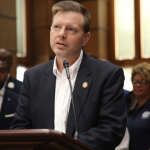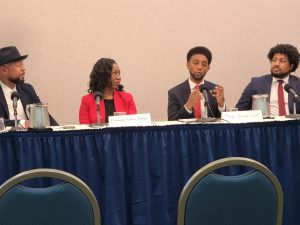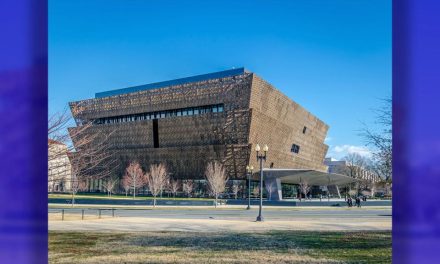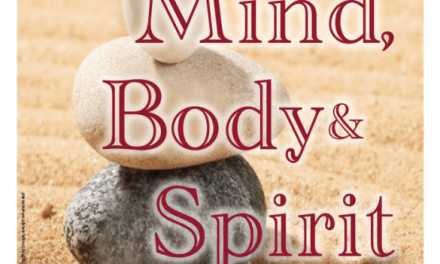By Keisa Sharpe Jefferson
The Birmingham Times
In a surprise vote on Tuesday, Darrell O’Quinn was elected by his colleagues as President of the Birmingham City Council.
Even O’Quinn, a veterinarian who has represented District 5 since 2017, was caught off guard. “I don’t know that I was fully prepared for this outcome,” O’Quinn said. “I was having a little difficulty concentrating after that went down. ‘Okay, what just happened?’
An earlier vote for council president resulted in a tie vote between Councilor Wardine Alexander (District 7), the incumbent president, and District 1 Councilor Clinton Woods. That resulted in a 4-4 stalemate with Carol Clarke abstaining.
Clarke then nominated O’Quinn as a third candidate and he received four votes, which with three candidates in the running was enough to give him the nod.
O’Quinn received votes from Clarke, Hunter Williams (District 2) , Valerie Abbott (District 3) and himself. “I have said all along that I’m willing to serve in whatever capacity my colleagues want me to and four colleagues, including myself, put me in that position (of City Council President),“ O’Quinn said. “Public service is exactly that – it involves a sacrifice. But this a sacrifice that is for the good of our community and I am proud to serve in that capacity.”
Alexander secured enough votes to be elected president pro tem, replacing Cystal Smitherman, with support from Councilors J. T. Moore (District 4), O’Quinn, Councilor LaTonya Tate (District 9), Clarke (District 8) and a vote for herself.
“I am excited to be in this particular role and to work with Dr. O’Quinn,” said Alexander. “I’m looking forward to his leadership. He’s a hard worker and dedicated person always looking at research and project management so that’s why I’m truly excited about this.“
” data-medium-file=”https://www.birminghamtimes.com/wp-content/uploads/2023/10/OQuinn-2-253×300.png” data-large-file=”https://www.birminghamtimes.com/wp-content/uploads/2023/10/OQuinn-2.png” class=”size-medium wp-image-115522″ src=”https://www.birminghamtimes.com/wp-content/uploads/2023/10/OQuinn-2-253×300.png” alt=”” width=”253″ height=”300″ srcset=”https://www.birminghamtimes.com/wp-content/uploads/2023/10/OQuinn-2-253×300.png 253w, https://www.birminghamtimes.com/wp-content/uploads/2023/10/OQuinn-2-354×420.png 354w, https://www.birminghamtimes.com/wp-content/uploads/2023/10/OQuinn-2.png 612w” sizes=”(max-width: 253px) 100vw, 253px” />
O’Quinn, and Alexander, a former medical technician, will serve through 2025.
Both said they look forward to working together to move the City of Birmingham forward.
In passing the council president baton, Alexander pledged a continued theme of unity and extended thanks to those who helped her in her role as former President of the Council and looked toward the future.
“Working together as a team, it’s going to be very exciting for members of the Council,” said Alexander. “This is going to great to work with Dr. O’Quinn, to transfer whatever knowledge I have and that we can work together with that.”











